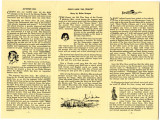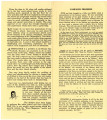| OCR Text |
Show AUTUMN 1954 GOING into our twelfth year, we see great changes in the lives of the Navajo People. The problems are increasing, and more and more we are convinced that the Church alone can meet them. We frequently get letters from all over, asking "Doesn't the Government take care of the Indians, with schools, hospitals and money?" It is true that the school situation is greatly improved and there are indications that at least partially adequate hospital facilities may in time be provided. But money, no. And perhaps it is just as well. The discovery of uranium on and near the Reservation has offered labor to many Navajos who now know what it is to have money, but who do not know how to take care of money. No sooner is a worker on a payroll than a used car salesman has him signed up, and perhaps the ore has run out or the car is wrecked, before all the payments are made, and meantime the traders wait impatiently for their accumulated accounts to be paid. Neither the Government nor its schools nor its hospitals nor its money can teach responsibility. The Church must take over not only what the Government has neglected but especially what the Government cannot do at all. So, with this issue of the N ewsletter- since the last two issues were concerned respectively with the evangelistic and the medical side of our Mission's activity-we present a story by our Helen Sturges about the School which has been an important feature since 1944. The summer has been busy. We started on a house for Fr. Powell, but the new Bishop of Chicago needs him, so we left the masonry work standing for the time being and got at the hospital again. The heating plant requires a separate house, far below the floor level; that is nearly finished now and the plumbing is all roughed in, the floor of the hospital is being poured and by the time you read this, doors and windows should be installed and work on the partitions started. Dick and Mike from Cincinnati put in many hours, and a crew of Navajos is carrying on. Nancy Booth came from Boston to pour a lot of honest sweat into various phases of the work, and Fr. Brown from new Haven has sampled both our callus-factory and our outstation work. There is a priest who should be on our staff; not only knows his priestly duties, but can wield a saw and hammer, and through books and records has equipped himself with the rudiments of Navajo language! - 1 - JESUS SAm "GO, TEACH!" Story by Helen Sturges THE Hastoi, the Old Wise Ones of the Navajo Medicine Men stood among the fragrant sage brush in a little gr~up apart from the rythmic music and the gay couples of the "Squaw dance." . Into the ancient War Dance ceremony the maIdens dragged their seemingly unwillin~ partne~s. The silver, turquoise, gay velvets, sWIrlmg skIrts and handsome blankets made a splash of color in the moonlight and the All flickering firelight on the bank of . the San Juan River. ~ . . •• The Old Wise Ones had weight- 'X'f ier matters to consider. No longer can the Reservation support all the Navajo, but the young men who venture into the outside world without knowledge of the white man's language or money, get only the poorest jobs, pay the highest prices and come home with no money and a new knowledge of evil. The parents have hated the schools forcing Navajo children to cut their hair and to use only the white man's language, so that many children forget how to talk and live with their parents. Now a Navajo youth says that the new Drag Robes at a mission near Bluff have a school where both Navajo and English words are taught and where the chief Drag Robe talks like a Navajo and is letting his hair grow like a proper Navajo man. After a long discussion a Medicine Man questioned Brother Juniper who was standing near the fire watching the dance. When the missionary asked, "Does our priest, Father Liebler, look like the kind of man who would make the boys cut their hair?" the Navajo s.aid, "No, and so we have named him Ee' nishodi Bitsi Neez (the Drage Robes, his hair is long) . We never heard of that kind of mission before, and we like it." ..... . -- 2 - MANY isolated areas have asked us for schools. One of the earliest was Montezuma Creek, 18 miles east as the crow flys and about 65 by primitive road. There Phyllis Johnson and I were dropp~d off the truck with provisions, bed rolls, and a drum of slightly oily water, to hold a ten-day summer school in a little ruined trading post. From fifteen to twenty-one persons, of all ages and utter~y devoid of English, came at 7 A.M. and stayed until 6 ~.M. without lunch. Hastiin To de Chini Tso (Stmky Water), gave us a delightull account of the history of the Navajo People. Graphic gestures and a :few words of English made his speech easily understood. He spoke of the time when the first Navajo ~ame to this area on the Flying Rock (now called ShIP Rock by the white man) , of the days when white men came across the seas in ships with wings and hrought trouble to this land. Then they came across the mountains seeking gold and land, always money and more money. They desecrated the Navajo's Mother the earth, by digging great holes. And there v.:as more and more trouble where the Navajo Medicine Men had taught their people to seek the path of beauty. Soon the Wise Ones could see that the white man would not go away, so the Navajo gave some of their beloved land to "Washington" in exchange for promises of schools for all the children and for doctors and medicine. "Washington" gave them papers and always more papers. Still the Navajo wait for medicine and still they wait for schools. Now the Eenishodi have come and promised schools and still the Navajo wait for schools. So Montezuma chapel and school were built when we could ill afford the time, money and workers. Services and religious instruction have been carried on. The Day School developed into a boarding school over night as the children rolled up in their blankets and said it was too far to go home. For the school year of '54-'55 we expect to have the school at Montezuma Creek, San Juan Bautista, in charge of Mr. and Mrs. James Rosa. Mrs. Rosa has had excellent training and experience in teaching in the east and we are delighted to welcome these capable and enthusiastic friends of the Missio, ~ and devout members of our Church. -3 - |






